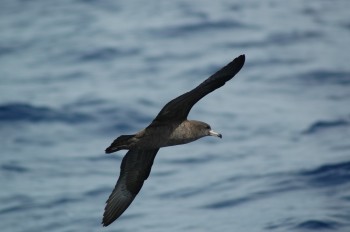Tim Reid (currently at the FitzPatrick Institute, University of Cape Town, South Africa) and colleagues writing on-line in the open-access journal PLoS ONE have looked at mortality factors and population trends for Flesh-footed Shearwaters Puffinus carneipes on Australia’s Lord Howe Island: “road mortality may be more than doubling natural mortality within the colony.”
The paper’s abstract follows:
“The population of flesh-footed shearwaters (Puffinus carneipes) breeding on Lord Howe Island was shown to be declining from the 1970's to the early 2000's. This was attributed to destruction of breeding habitat and fisheries mortality in the Australian Eastern Tuna and Billfish Fishery. Recent evidence suggests these impacts have ceased; presumably leading to population recovery. We used Bayesian statistical methods to combine data from the literature with more recent, but incomplete, field data to estimate population parameters and trends. This approach easily accounts for sources of variation and uncertainty while formally incorporating data and variation from different sources into the estimate. There is a 70% probability that the flesh-footed shearwater population on Lord Howe continued to decline during 2003–2009, and a number of possible reasons for this are suggested. During the breeding season, road-based mortality of adults on Lord Howe Island is likely to result in reduced adult survival and there is evidence that breeding success is negatively impacted by marine debris. Interactions with fisheries on flesh-footed shearwater winter grounds should be further investigated.”

Flesh-footed Shearwater at sea. Photograph by Tim Reid
Reference:
Reid, T., Hindell, M., Lavers, J.L. & Wilcox, C. 2013. Re-examining mortality sources and population trends in a declining seabird: using Bayesian methods to incorporate existing information and new data. PLoS ONE 8(4): e58230. doi:10.1371/journal.pone.0058230.
John Cooper, ACAP Information Officer, 20 April 2013

 English
English  Français
Français  Español
Español